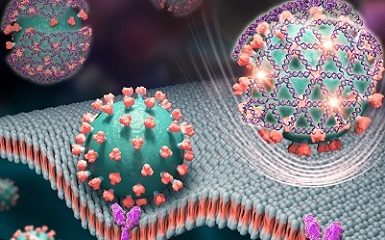Thailand Medical Researchers From Prince Of Songkhla University Discover SARS-CoV-2 Mutation F306L That Drives Fatality!
Nikhil Prasad Fact checked by:Thailand Medical News Team Apr 04, 2024 1 year, 9 months, 1 week, 5 days, 22 hours, 16 minutes ago
Thailand Medical: In recent times, the global health community has been grappling with the challenges posed by the emergence of new variants of the severe acute respiratory syndrome coronavirus-2 (SARS-CoV-2), the virus responsible for the coronavirus disease 2019 (COVID-19) pandemic. Thailand, like many other nations, has faced waves of infections driven by different variants of the virus, leading researchers to delve deeper into the genetic diversity of SARS-CoV-2 and its implications. A groundbreaking study conducted by medical researchers from Prince of Songkhla University in Hat Yai, Songkhla, Thailand that is covered in this
Thailand Medical News report, sheds light on a particularly significant mutation, F306L, and its association with increased virulence and fatality rates.
 Thailand Medical Researchers From Prince Of Songkhla University
Thailand Medical Researchers From Prince Of Songkhla University
Discover SARS-CoV-2 Mutation F306L That Drives Lethality
B
ackground
Thailand's experience with COVID-19 has evolved over time. In 2020, the country effectively controlled the initial spread of the virus. However, subsequent waves, particularly in 2021 and 2022, brought about by variants like B.1.617.2 (Delta) and B.1.1.529 (Omicron), presented new challenges. The study focused on the five southernmost provinces (FSPs) of Thailand: Phatthalung, Songkhla, Yala, Pattani, and Narathiwat. This region's unique demographics and geographic proximity to Malaysia made it an intriguing area for studying viral transmission patterns.
Genomic Analysis
The researchers analyzed 1942 whole-genome sequences of SARS-CoV-2 collected between April 2021 and March 2022. The majority of the sequences belonged to the Delta and Omicron variants. Notably, the AY.85 variant, a sub-lineage of Delta, was predominant in the dataset. Within the AY.85 variant, the F306L mutation in the spike protein caught the researchers' attention due to its high prevalence (36.43% of AY.85 sequences). This mutation, although not previously associated with the AY.85 variant, showed potential implications for viral behavior.
Phylogenetic Insights
Phylogenetic analysis revealed distinct clusters of viral variants, with AY.85 forming its own cluster due to the presence of the F306L mutation. Interestingly, this mutation was not limited to the AY.85 variant but was also found in other SARS-CoV-2 variants worldwide, indicating its evolutionary significance and potential impact on viral characteristics.
Molecular Dynamics: F306L Mutation
The F306L mutation occurs near the receptor-binding domain (RBD) of the spike protein, a crucial region for viral entry into host cells. Through in silico analysis, the researchers investigated how this mutation might affect the interaction between the spike protein and the human ACE2 receptor. Their findings suggested that the F306L mutation led to tighter binding between the spike protein and ACE2, potentially enhancing viral infectivity and transmission.
gt;Viral Load and Clinical Outcomes
Despite the increased binding affinity associated with the F306L mutation, analysis of viral loads among patients infected with different variants did not show significant differences. However, when examining fatality rates, patients infected with the AY.85 variant carrying the F306L mutation exhibited a higher fatality rate compared to those with the non-mutated AY.85 variant. This observation held true even after adjusting for factors like age, sex, and geographical location.
Factors Influencing Fatality Rates
Age was a significant factor affecting fatality rates, with older individuals facing a higher risk of severe outcomes. Geographical differences within the FSP area also played a role, possibly influenced by variations in healthcare access and response measures. Surprisingly, the study did not find a significant difference in fatality rates between males and females, contrary to some global trends observed in COVID-19 mortality.
Global Implications and Future Directions
The widespread presence of the F306L mutation across different SARS-CoV-2 variants worldwide underscores its importance in viral evolution. Monitoring and studying this mutation are crucial for understanding its impact on viral pathogenesis, transmission dynamics, and clinical outcomes. Further experimental studies, including in vitro and in vivo investigations, are warranted to elucidate the mechanisms through which the F306L mutation influences viral behavior and host responses.
Public Health Considerations
The findings from this study have significant implications for public health strategies, especially in regions with a high prevalence of the AY.85 variant carrying the F306L mutation. Enhanced surveillance, genomic sequencing efforts, and targeted interventions may be necessary to mitigate the impact of this variant on disease severity and mortality. Vaccination campaigns and access to healthcare resources must also be prioritized, particularly for vulnerable populations.
Conclusion
The discovery of the F306L mutation and its association with increased fatality rates in SARS-CoV-2 infections highlights the dynamic nature of viral evolution and its implications for public health. This study from Prince of Songkhla University in Thailand provides valuable insights into the genetic diversity of SARS-CoV-2 and underscores the importance of ongoing research to combat the COVID-19 pandemic effectively. As new variants continue to emerge, collaboration between researchers, healthcare professionals, and policymakers remains essential in navigating the evolving landscape of the pandemic.
The study findings were published in the peer reviewed journal: Scientific Report (Nature).
https://www.nature.com/articles/s41598-024-56646-6
For the latest Thai Medical Research, keep on logging to Thailand Medical News.
